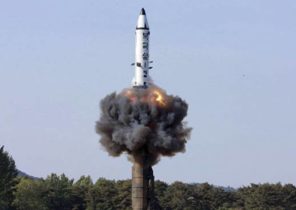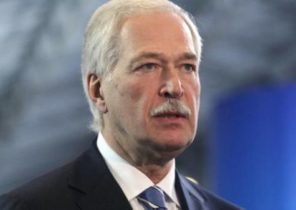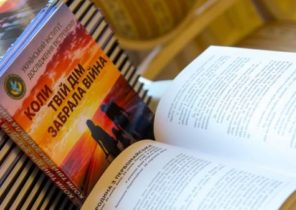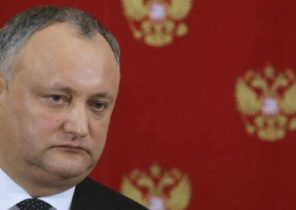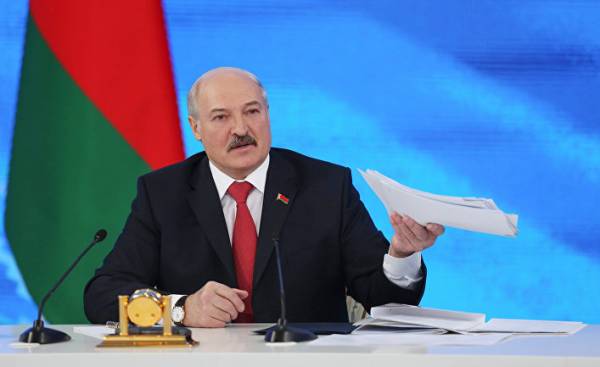
Belarus, as a rule, is in first place in the list of countries, of which the following ordinary Americans. Recent events, however, there was a compelling reason to pay attention to this country. In mid-February, in response to the introduction of a tax for those who work less than six months, began public protests against the regime of Alexander Lukashenko. Since then, they became more popular and evolved into the requirement for systemic political change. This clash with a regime that is not accustomed to challenges. The protest also exacerbated the fears of the Kremlin, that he might again encounter another “color revolution” on its border, and it can cause a harsh response of Russia.
Outside observers could be forgiven for what they did not notice the wind of change in Belarus, where everything seemed unchanged. However, there have been changes even in the “last dictatorship of Europe”; they were caused by the crisis in Ukraine, which has triggered a number of changes in relation to Lukashenko to both the West and Putin, the changes continue gradually. Fearing that the West might support an uprising like Maidan against him, as well as testing the need for Western investment to promote economic growth (overly dependent on the declining Russian economy) during the recession, Lukashenko has offered to mediate in the ongoing confrontation between Russia and the West over Ukraine. The annexation of the Crimea by Putin and the escalation of the conflict in the East of Ukraine also made Lukashenka to fear that Russia may take such action in Belarus, if it deems that its interests there are threatened. So, he gradually started to make attempts to improve relations with the West, at the same time, maintaining communications security and the strategic Alliance with Moscow, whose support he needed to preserve his power.
Taking into account the opinion of the West, Lukashenko made a limited number of small, unauthorized protests, such as last year, during a debate on whether to allow Russia to place air base in Belarus (Minsk could evade this requirement by Putin, agreeing on the purchase of new Russian fighter aircraft for the Belarusian military, which are then used in the framework of a unified air defense system, and also agreeing to take part in the joint air defense system). Over the past year, in favor of the West, he also freed several prominent political prisoners. March 1, 2016, in trying to improve relations with the EU, the Ministry of internal Affairs of Belarus announced a more lenient position regarding the protests. They will no longer detain the protesters, but the police can still press charges, and demonstrators will be required to appear in court and pay the fine, but they will not have to serve a prison sentence. This change, like everything else, set the stage for the events of the last month that could change as internal and external policy of Belarus.
The EU responded positively, just over a year ago, he voted for the lifting of sanctions that have been imposed 170 Belarusian officials, including President Lukashenka, in 2010. Then Lukashenko cracked down on demonstrators after the victory in the presidential election that was marred by fraud. (Sanctions against some officials remain in force.) The lifting of sanctions followed the visit to Minsk by high-ranking delegations of the EU and Lukashenka started to move in the direction of gradual political transformation.
Most recently, Lukashenko has taken other steps that have caused the approval of the West and the anger of Moscow, among them — the liberalization of visa requirements for over 80 countries, including the US and the EU. In response, Russia introduced border controls with Belarus, border with which to “open”, resulting in Lukashenko accused Moscow of a “violation of treaties”. Russian dissatisfaction with the new visa regime, declared Minsk, was so strong that the editors of the leading Belarusian opposition news outlets suggested that Putin decided to deal with Lukashenko.
With the beginning of the year grows more and more obvious gap between Minsk and Moscow, which is largely due to tensions between the two countries because of the flirt of Belarus with the West and fears of Moscow that it could lose Belarus as well as Ukraine lost. Although in the past this fear seemed far-fetched, the evolution of political protests and the government’s response to them make them seem more real. Russian media indicated that Moscow sees Belarus as a parallel with the situation in Ukraine several years ago. Russian media blame current events flirting with the West, Lukashenko, and I suspect that behind this lies the hand of the West. The strategic importance of Belarus for the Russian equivalent to Ukraine, Minsk, the orbit will become a strategic disaster, especially given the estrangement that has occurred between Russia and Ukraine. This will open the door for potentially aggressive moves by Putin, who will try to maintain Belarus in the Russian sphere of influence if events start to spiral out of control.
From the point of view of Putin, a dangerous situation in Belarus has developed just at the time when there was a chance to change the political environment in Europe in its favor, since the elections in Europe could lead to power of the party and the government, more favorable to Moscow. Now he was faced with the specter of another “color revolution” on their doorstep. Putin, of course, noted the fact that the protests are spontaneous and organic, but not organized opposition party or hostile foreign country, which makes them even more disturbing.
Moscow returned to its typical behavior — the use of energy as a geopolitical weapon, it threatens to set for Belarus the same price that Europe pays — is a significant improvement. Such a threat provoked an angry response Lukashenko last Thursday: “If some people think they can constantly put pressure on us and put us to our knees, it will not.” A month ago, Lukashenko also angrily lashed out at the Kremlin, accusing it of breach of contract (in connection with Russia’s decision to establish a border control at an earlier opened the Russian-Belarusian border) and that he uses his role as the sole provider of energy in Belarus “to take us by the throat”. Sending a signal that he values independence above all else reliable energy supplies, Lukashenko also claimed that “independence is not comparable to oil.” Lukashenka recently made a speech to the armed forces, in which special importance was attached to the territorial integrity of Belarus, which was underlined by the comment in Moscow.
The current wave of protests began in mid-February in response to the government’s plans to introduce a tax for unemployed approximately $ 250 — a tax with different names, including “tax on social parasites”, “the tax” and “tax for vagrants”. As explained by Mitchell Polman in The Hill a few days ago, the regime skillfully used economic coercion to achieve political peace in the country, where the vast majority of workers are employed either in state enterprises and in industry, either directly by the state.
Now, however, conditions change, this leads to the fact that citizens do not want to allow themselves to be controlled. The last few years, the Belarusian economy is experiencing difficulties, under the impact of the sharp fall in oil prices from highs in June 2014, and serious economic problems in neighboring Russia, the most important trading partner of Belarus and countries with economies in which Belarus is connected most closely. This complicated the lives of Belarusian citizens and the government, which must find ways to stop the financial bleeding. Methods invented by the government, only increased the burden for citizens, contributing to their frustration with the deteriorating economic situation. In addition, the government increased the retirement age to reduce the burden on the state Treasury (as of 1 January 2017).
Tax on unemployment was the last straw and forced people to take to the streets. Many have done it, had not yet been introduced this tax, but they will not be able to continue in the same way, if Lukashenko will continue this policy. The total number of protesters does not seem like much to Westerners, in the middle of February in Minsk protests began with little more than two thousand people, the number grew to about five thousand people, and hundreds of people in Brest (on the Polish border), Mogilev, Bobruisk and Gomel (the town in the Southeast of Belarus, near the territorial merger of Belarus, Russia and Ukraine, the symbolism of which probably has caused some alarm in the Kremlin), and about one thousand in Vitebsk (near Russian border). Although the total number is relatively small, the degree of change in Belarus proves the fact that the protests actually happened, what the government allowed them to continue in a country where the internal security service retained the name “KGB”, in which protests in the past caused a violent reprisal by the government.
At the same time, the domestic political position of Lukashenko under increasing doubt. More than 400 thousand refused to pay the tax on unemployment and Lukashenko was faced with mass civil disobedience. Tax seems was the last straw, and forced many Belarusians to seek deeper political change, and the protests turned into the need for broader, systemic political change. The fact that the protests are not only in Minsk, but in many other cities, as well as evidence that the dissatisfaction is widespread and in rural areas, indicates that Lukashenko’s position is less stable than expected by most outside observers.
Lukashenko in an unenviable position — he could not afford openly to quarrel with Moscow, because the continuation of his rule depended on the support of Russia. At the same time, he does not want to disperse the demonstrators, so as not to undo all the efforts that he has made in the last three years, to improve relations with the West, efforts that have borne some fruit. In any case, a return to the previous situation impossible.
He was forced to make concessions to the protesters; and the protesters, and the nascent political opposition in Belarus (which had previously been extremely timid, but now inspired by the success of protests) believe that the regime for the first time, hesitant and vulnerable. Two weeks ago the Ministry of internal Affairs announced that in accordance with the Ordinance promulgated a year ago will not attract a special division of police on the streets to combat the protests. The Ministry stated that he sees no sense in such actions “only for the show of force”, and actually ceded the streets to protesters. Last Thursday, Lukashenko has temporarily stopped action of the decree on taxes that caused the initial protests, though not yet abolished it. Protest leaders refuse to accept just “suspension” of the tax proposed by the President, and require a broader and deeper changes. Lukashenko also promised to discipline government officials who unjustly called citizens “parasites” and last week called for the creation of spaces for peaceful dialogue between citizens and public officials. His statement on this issue showed how subtly he tries to keep balance within the country and to closely observe them by the West and Russia, in providing a larger freedom while maintaining political control. “People need to be places where they can Express their opinion, as in developed countries in the West. But all attempts to create disorder or violence must be stopped immediately,” — said Lukashenko.
He tries to calm the crowd in the hope that it will dissipate. However, there are indications that this will not happen. For the first time people feel the possibility of real changes and are unlikely to miss it. If they continue, and the Lukashenka regime will be in serious danger, the Kremlin will begin to consider the possibility of further dominance in Belarusian politics through control of the probable successors of the President. Putin will not lose sleep because of Lukashenka, as he will be able to control what’s happening in Minsk. After the financial and reputational costs, as well as the negative economic impact of sanctions on Russia after the annexation of Crimea and military actions in Eastern Ukraine (not to mention the financial costs of Russia’s actions in Syria, which were also huge), the last thing Putin needs is to get involved in another conflict in Belarus. At the beginning of the tenure of the President of the United States Donald trump, Moscow considered him a hope for a potentially closer relationship with the United States. But the situation in Belarus is becoming very dangerous for Moscow at this stage it will not be able to justify their aggressive actions, which would deprive it of the ability of Russian-American cooperation in Syria, or anywhere else — or potential understanding with Washington. However, if the situation changes to such an extent that Moscow will not be confident that its interests in Belarus in security, it is more likely that it would take decisive action to protect their positions there. Such actions, in turn, can create the first real confrontation between Vladimir Putin and the new administration of Donald trump.
Belarus remains only to follow closely the developments in the coming days and weeks. The nature of changes occurring there, and how they react to external forces will determine not only internal but also external policy of Belarus, and also in the future will have a significant impact on the formation of relations between Russia and the West.

